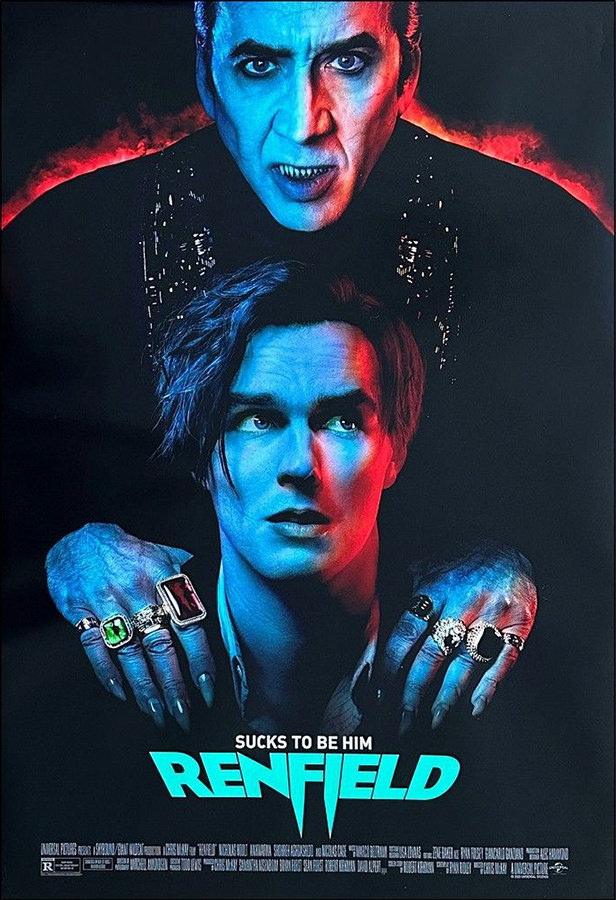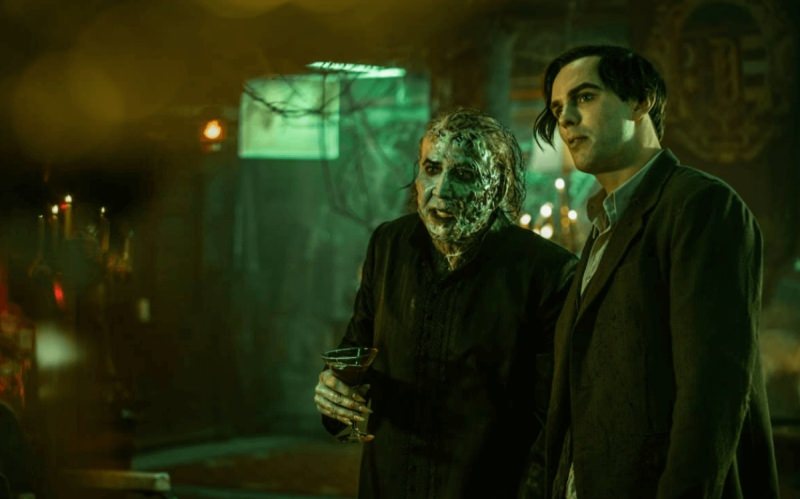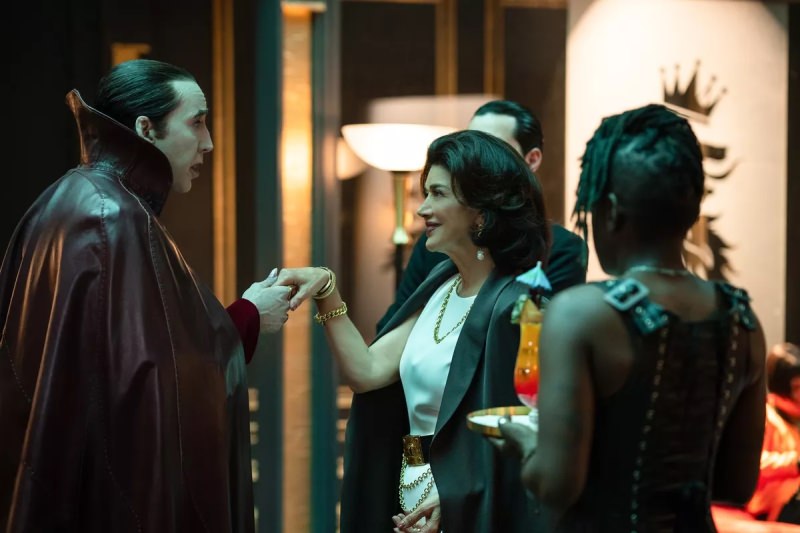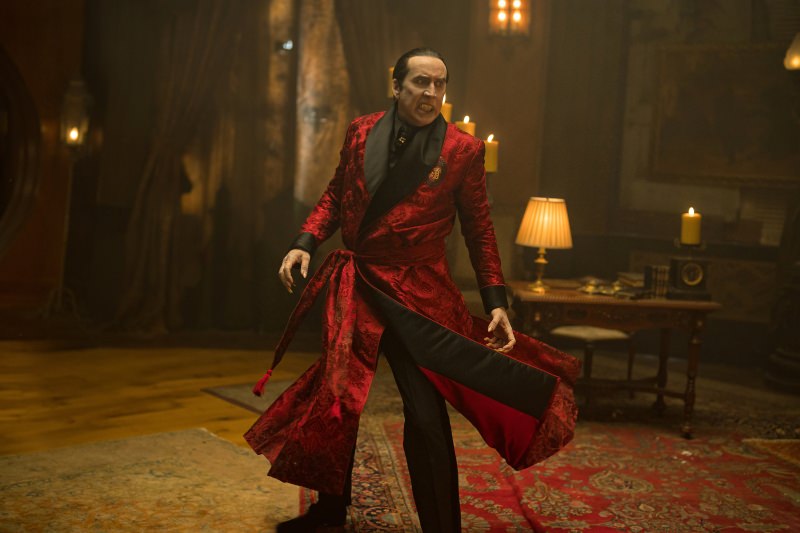Renfield
Directed by Chris McKay (2023) **
 Pity the creators of the Universal Monsters Universe (aka as the Dark Universe). With images of the Marvel Cinematic Universe (and the dollars it has generated) dancing in their heads, Universal Pictures planned for a cohesive, shared cinematic universe which would incorporate and overlap all of the company’s classic 1930s horror protagonists. 2017’s The Mummy was to be the foundation, a corporate contraption with Easter eggs alluding to forthcoming films — films that, as it happened, never came. The Mummy, starring Tom Cruise, received atrocious reviews and, worse, lost about eighty million dollars. Most of the next films in the series were cancelled. What the Universal execs had forgotten was that it all comes down to talent. They desperately needed the kind of pop-culture savvy creatives the Marvel films used, like Kevin Feige, Sam Raimi, Joss Whedon, Robert Downey, Jr., and the Russo brothers.
Pity the creators of the Universal Monsters Universe (aka as the Dark Universe). With images of the Marvel Cinematic Universe (and the dollars it has generated) dancing in their heads, Universal Pictures planned for a cohesive, shared cinematic universe which would incorporate and overlap all of the company’s classic 1930s horror protagonists. 2017’s The Mummy was to be the foundation, a corporate contraption with Easter eggs alluding to forthcoming films — films that, as it happened, never came. The Mummy, starring Tom Cruise, received atrocious reviews and, worse, lost about eighty million dollars. Most of the next films in the series were cancelled. What the Universal execs had forgotten was that it all comes down to talent. They desperately needed the kind of pop-culture savvy creatives the Marvel films used, like Kevin Feige, Sam Raimi, Joss Whedon, Robert Downey, Jr., and the Russo brothers.
Because Universal still owns the monster properties, though, it continues to use them in one way or another. The Invisible Man was reborn in 2020 as a sci-fi stalker film. This year’s Lisa Frankenstein is a poorly reviewed ’80s-style teen comedy. The Last Voyage of the Demeter, based on a chapter from Bram Stoker’s novel, is a Dracula movie without Dracula in the title. And so is Renfield, fashioned as a horror comedy in the mode of Shaun of the Dead.
 What makes the film promising is Nicolas Cage, who plays the age-old Transylvanian Count. The film begins with Cage as Dracula and Nicholas Hoult as his servant, Renfield, incorporated into old B&W footage from the original 1931 Dracula film and it looks great. After Dracula is nearly felled in a bout with vampire hunters, Renfield brings the Count’s decaying body to New Orleans, 2023, to gradually heal and come to full power again. In the meantime, Renfield brings bodies for Dracula to feast on; Renfield also eats bugs which generate amazing strength and agility when needed in scrapes.
What makes the film promising is Nicolas Cage, who plays the age-old Transylvanian Count. The film begins with Cage as Dracula and Nicholas Hoult as his servant, Renfield, incorporated into old B&W footage from the original 1931 Dracula film and it looks great. After Dracula is nearly felled in a bout with vampire hunters, Renfield brings the Count’s decaying body to New Orleans, 2023, to gradually heal and come to full power again. In the meantime, Renfield brings bodies for Dracula to feast on; Renfield also eats bugs which generate amazing strength and agility when needed in scrapes.
The conceit of the film is that Renfield is in a 12-step program for abusive, co-dependent relationships. He wants out. It’s a take that probably sounded funnier on paper than it plays on film, and it’s also a bit cliche, twenty-five years after The Sopranos.  Getting entangled in Renfield’s plan to disentangle himself is a crime family run by the malicious Bellafrancesca (Shohreh Aghdashloo) and her incompetent son, Tedward (Ben Schwartz), as well as a traffic cop, Rebecca, played endearingly by Awkwafina. I blame screenplay writer Ryan Ridley (and maybe the author of the original story, comic book writer Robert Kirkman, as well), because nearly all the screen time taken telling these entwining stories was, for this viewer, time wasted when I could have been watching Nicolas Cage. It’s far from Awkwafina’s fault, but as soon as the film started establishing a motive-filled backstory for her character, my eyes began to glaze over. Who cares? (Her character does have the funniest line in the film: “Did I watch you cut a guy’s arms off with a decorative serving platter?”)
Getting entangled in Renfield’s plan to disentangle himself is a crime family run by the malicious Bellafrancesca (Shohreh Aghdashloo) and her incompetent son, Tedward (Ben Schwartz), as well as a traffic cop, Rebecca, played endearingly by Awkwafina. I blame screenplay writer Ryan Ridley (and maybe the author of the original story, comic book writer Robert Kirkman, as well), because nearly all the screen time taken telling these entwining stories was, for this viewer, time wasted when I could have been watching Nicolas Cage. It’s far from Awkwafina’s fault, but as soon as the film started establishing a motive-filled backstory for her character, my eyes began to glaze over. Who cares? (Her character does have the funniest line in the film: “Did I watch you cut a guy’s arms off with a decorative serving platter?”)
 The film is exceedingly violent in a crazy, cartoonish way, with spurting blood, severed limbs and decapitated heads, all in a day’s work. None of the scenes have the kind of sharp wit needed for a comedy. For a truly funny (one could even say classic) vampire comedy, see Taika Waititi’s 2014 mockumentary, What We Do in the Shadows. Made for only $1.6 million (as opposed to Renfield‘s $65 million), it’s an excellent example of a really funny script and actors trumping everything else.
The film is exceedingly violent in a crazy, cartoonish way, with spurting blood, severed limbs and decapitated heads, all in a day’s work. None of the scenes have the kind of sharp wit needed for a comedy. For a truly funny (one could even say classic) vampire comedy, see Taika Waititi’s 2014 mockumentary, What We Do in the Shadows. Made for only $1.6 million (as opposed to Renfield‘s $65 million), it’s an excellent example of a really funny script and actors trumping everything else.
Renfield needs more Cage, who plays Dracula with relish and improvisatory fun. The expertly edited end credits sequence gives glimpses of what the film could and should have been. The bottom line: when you’ve got pure gold in Nicolas Cage, why make a movie about Renfield when you’ve got Dracula?
—Michael R. Neno, 2024 March 12